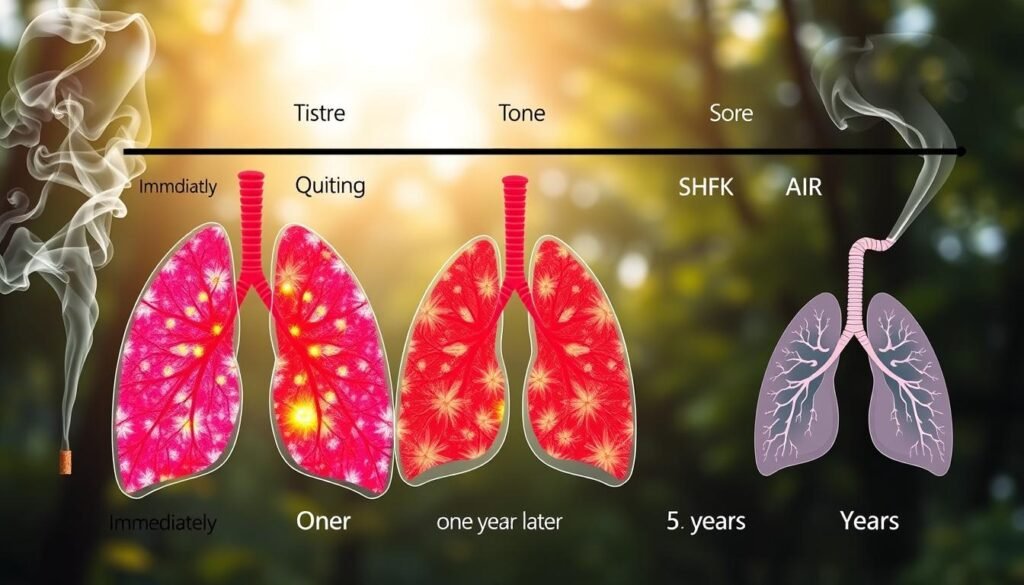Did you know that quitting smoking can add up to 10 years to your life? This fact might be shocking for many long-term smokers. It shows how big the health benefits of quitting are. Even if smoking has been a part of your life for years, it’s not too late to see significant health improvements. Quitting smoking cuts the risk of early death and many serious health problems. This includes heart diseases, lung conditions like COPD, and various cancers.
Quitting has huge benefits, even for those who’ve smoked for decades. Just 1-2 years after quitting, your heart disease risk drops sharply. Within five years, your stroke risk can be as low as someone who never smoked. Plus, quitting is not just good for you. It also stops your loved ones from breathing in harmful secondhand smoke. In this piece, we’ll explore how quitting, even after years of smoking, can transform your health, mood, and finances dramatically.
Key Takeaways
- Quitting smoking can add up to 10 years to life expectancy.
- The risk of coronary heart disease decreases significantly within 1-2 years of cessation.
- Long-term smokers who quit can still experience major health improvements.
- Cessation reduces risks of various cancers, including lung and bladder cancer.
- Quitting smoking also protects loved ones from the dangers of secondhand smoke.
Understanding the Risks of Long-Term Smoking
Long-term smoking is very harmful and leads to many diseases. It can cause COPD, different types of cancer like lung cancer, and heart problems. Every year, smoking or being around tobacco smoke causes about 480,000 early deaths in the U.S. Cancer is responsible for 36% of these deaths. This shows how tobacco greatly harms our society.
In tobacco smoke, there are over 250 dangerous chemicals. These include harmful substances like hydrogen cyanide, carbon monoxide, and ammonia. Out of these, at least 69 chemicals can cause cancer. Nicotine in cigarettes is super addictive, making it very hard for people to stop smoking. This addiction keeps people smoking and harms their health more over time.
Knowing the risks of smoking for a long time is crucial for smokers. They should think about the risks of lung cancer, COPD, and heart problems a lot. Smokers are almost three times more likely to die than people who don’t smoke. This makes it very important for them to understand these dangers.
Secondhand smoke is also very dangerous. It causes about 7,300 lung cancer deaths and 34,000 heart disease deaths in non-smokers every year. The risk goes beyond the smoker, affecting their family and friends too. You can find more on COPD and lung cancer, and how to spot their symptoms, here.
Health Benefits of Quitting Smoking
Quitting smoking has many health bonuses that begin right away. In just 20 minutes, your blood pressure and heart rate can be back to normal. These improvements to your circulation kickstart a series of positive changes.
Within 12 hours, the amount of carbon monoxide in your blood drops to normal. This leads to better oxygen levels and overall health. After just a few weeks, you’ll notice your lungs work better and your blood flows more easily.
The gains from quitting smoking keep getting better over time. By 9 months, coughing and breathing problems start to fade. This shows your lungs are getting healthier. A year after quitting, your chance of heart disease is cut in half.
After 5 years without smoking, you are at a lower risk for many types of cancer. These include cancers of the mouth, throat, esophagus, and bladder. By 10 years, you are half as likely to die from lung cancer compared to smokers.
15 years after quitting, your risk of heart disease is the same as someone who never smoked. Stopping smoking leads to healthier pregnancies too. It lowers the risk of issues like low birth weight and early labor.
Quitting smoking isn’t just good for your health. It saves you money as well. If you used to smoke a pack a day, you could save about $2,000 each year. These health and financial benefits highlight why stopping smoking is so important.

| Time Frame | Health Benefit |
|---|---|
| 20 Minutes | Blood pressure and heart rate drop to normal. |
| 12 Hours | Blood carbon monoxide level drops to normal. |
| 2 Weeks to 3 Months | Circulation improves and lung function increases. |
| 1 to 9 Months | Coughing and shortness of breath decrease. |
| 1 Year | Risk of coronary heart disease is halved. |
| 5 Years | Risk of various cancers reduced by half. |
| 10 Years | Risk of dying from lung cancer is half that of a smoker. |
| 15 Years | Risk of coronary heart disease equals that of a non-smoker. |
How Quitting Smoking Reduces Lung Cancer Risk Over Time
Quitting smoking can greatly decrease the risk of lung cancer for those who have smoked for years. If you stop smoking, especially after finding out you have early-stage lung cancer, you could live about 22 months longer than if you keep smoking. This shows how stopping smoking has a strong impact.
When you quit smoking, the disease takes longer to get worse. People who have stopped smoking can go 5.7 years without their disease getting worse. This is compared to 3.9 years for those who keep smoking. The cancer remission timeline shows quitting right after diagnosis is important.
Also, those who quit smoking have a better chance of surviving. They have a 9% better chance of living three years after diagnosis. And a 12% better chance after five years. About 42.5% of people stop smoking once they find out they have cancer. Most of them quit soon after learning about their diagnosis.
Statistics show that 85% of lung cancer cases come from smoking. If you quit smoking before you turn 40, you might reduce your chance of dying early from smoking-related diseases by 90%. Quitting even after getting a cancer diagnosis can still lower your death risk from some cancers by 40%.

| Timeframe After Quitting | Potential Reduction in Lung Cancer Risk |
|---|---|
| 1-5 years | Risk decreases to 50% of that of a continuing smoker |
| 10 years | Further reduction of risk, closer to non-smokers |
| 15 years | Risk similar to that of non-smokers |
The Benefits of Cessation Even in Long-Term Smokers
Quitting smoking brings many health benefits, especially for those who have smoked for years. Former smokers see big health improvements. This includes better lung function and fewer diseases from smoking. Even if you’ve smoked for a long time, stopping can lead to a longer, healthier life.
Improved Lung Function and Respiratory Health
Stopping smoking improves lung function for long-time smokers. Studies show quitting leads to better respiratory health. People breathe easier and have less COPD symptoms and infections. Here are some studies on lung health after quitting.
Quitting stabilizes lung function and slows down its decline. This allows for a more active lifestyle.
Lower Risk of Smoking-Related Diseases
Quitting smoking not only improves lung function but also reduces disease risks. Former smokers have a lower chance of getting heart disease and various cancers. Within one to two years of quitting, heart disease risk drops greatly.
Quitting also lowers the risk of lung and bladder cancer. For those who have had cancer, stopping smoking improves survival rates. This leads to a better quality of life over the years.
Impact on Cardiovascular Health After Quitting
When people stop smoking, their heart health gets much better. They have a lower risk of heart disease as time goes on. Their hearts and blood vessels become stronger, too.
Reducing Heart Disease Risk
Smoking causes a lot of heart problems worldwide. Quitting can cut the risk of heart disease a lot in just 1-2 years. If someone quits by 40, they might avoid 90% of the risk of dying from these diseases. This shows how big a difference quitting can make.
Effects on Blood Pressure and Circulation
Quitting smoking improves blood pressure and circulation. Smoking harms blood vessels, leading to higher blood pressure and poor circulation. Stopping smoking helps arteries work right again.
This makes for better blood flow and lowers blood pressure. It greatly reduces the likelihood of heart attacks and strokes. This highlights how quitting smoking is key for heart health.

The Positive Changes in Your Body Post-Cessation
Quitting smoking starts a great change in the body, leading to quick and long-lasting health gains. Knowing these changes can motivate people to improve their health.
Immediate Physiology Changes
Right after you quit smoking, your body begins to heal. In just 20 minutes, your heart rate and blood pressure normalize. This helps your heart and arteries start to recover. Three days later, there’s no nicotine left in your body. This raises your blood’s oxygen levels and helps your lungs work better. It also starts lowering your cancer risk.
Long-Term Health Benefits Timeline
The benefits over time are impressive. One year without smoking cuts your heart disease risk in half. Between two and five years, your risk of cancers of the mouth, throat, esophagus, and bladder drops by half. Ten years smoke-free, and your chances of dying from lung cancer are much lower. Your stroke risk becomes the same as if you’d never smoked. These outcomes show how quitting smoking can have amazing effects on your health and lower your cancer risk.
Quitting smoking marks a key step towards better health. It’s vital for people to remember these benefits. This helps them stay committed to a life without smoking. For more details on health benefits after quitting, check out the Lung Association website.
Economic Benefits of Quitting Smoking
Stopping smoking has big financial benefits. Smokers spend a lot on cigarettes, leading to large yearly costs. A person smoking 20 cigarettes a day spends about £3,600 a year. Someone smoking 11 cigarettes a day spends around £1,800. Quitting smoking means saving this money for healthier activities or savings.
Cost Savings from Not Buying Cigarettes
Quitting smoking quickly improves your finances. People see an increase in their money available for other things once they stop buying cigarettes. For example, they can spend on a healthier lifestyle or save for better things. This change helps make more responsible financial choices.
Reduced Healthcare Expenses
Stopping smoking also cuts healthcare costs. Smoking-related illnesses led to 1.7 million hospital admissions in England recently. Not smoking reduces health risks and medical costs. Healthier lives mean less strain on healthcare systems. This has wider financial benefits for society. More information is available in studies like this one.
Protecting Others: Secondhand Smoke Exposure
Secondhand smoke exposure is a major public health concern. Brief contact with this smoke can lead to many health issues. It releases over 7,000 chemicals, with nearly 70 being known to cause cancer. This is especially risky for children and pregnant women.
Children are particularly at risk from secondhand smoke. It raises their chances of Sudden Infant Death Syndrome (SIDS), respiratory infections, and asthma. Their lung growth can also be slowed. Sadly, they are often exposed to this danger in homes and workplaces. This has led to calls for strong smoke-free laws. These laws can help protect non-smokers and encourage people to quit smoking.
Each year, secondhand tobacco smoke causes over 19,000 deaths in the U.S. This includes more than 7,300 non-smokers dying from lung cancer. Non-smokers exposed to this smoke have a 20% to 30% higher chance of developing lung cancer. In fact, it increases the risk of lung cancer two to three times. Black adults face more than double the secondhand smoke exposure compared to white and Mexican Americans.
| Health Effects of Secondhand Smoke | Statistics |
|---|---|
| Childhood Respiratory Issues | Higher risk of asthma and wheezing |
| Risk of SIDS | Increased risk among babies |
| Lung Cancer Deaths | Over 7,300 for non-smoking adults |
| Workplace Exposure | Common among workers in smoking environments |
| Economic Loss | Estimated at $7.2 billion in 2017 |
To reduce the risks from secondhand smoke, we need total bans on tobacco use. This includes e-cigarettes. E-cigarettes can release harmful substances. These substances can harm non-users, especially kids and young adults. It’s important to spread the word about these dangers. By raising awareness, we can create a healthier environment. This helps protect everyone from the harmful effects of tobacco.
Support and Resources for Smoking Cessation
Quitting smoking is tough, but having the right support can make a big difference. Over half of U.S. adults have kicked the habit, showing that help works. Getting counseling and using nicotine replacement therapy (NRT) is the best combo to beat nicotine addiction.
There are many NRT options like patches, gum, and lozenges, plus prescription choices. Using a nicotine patch with gum or lozenges improves quit chances. There are even free or insurance-covered treatments to ease the cost for those wanting to quit.
About 40% of smokers try to quit each year, but many find it hard to stick with it. Support from structured programs can make a huge difference in those crucial early days. Trying different methods, such as bupropion or therapy, helps too. Those who use medicine and get support have a better chance at quitting for good. Quitting smoking seems hard, but with strong support, it’s possible.